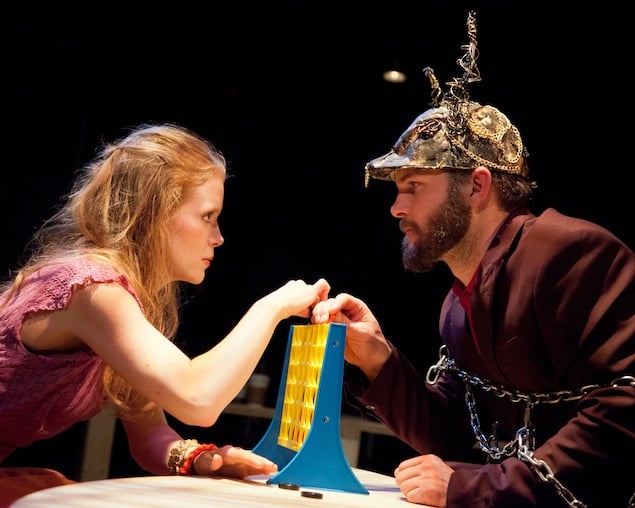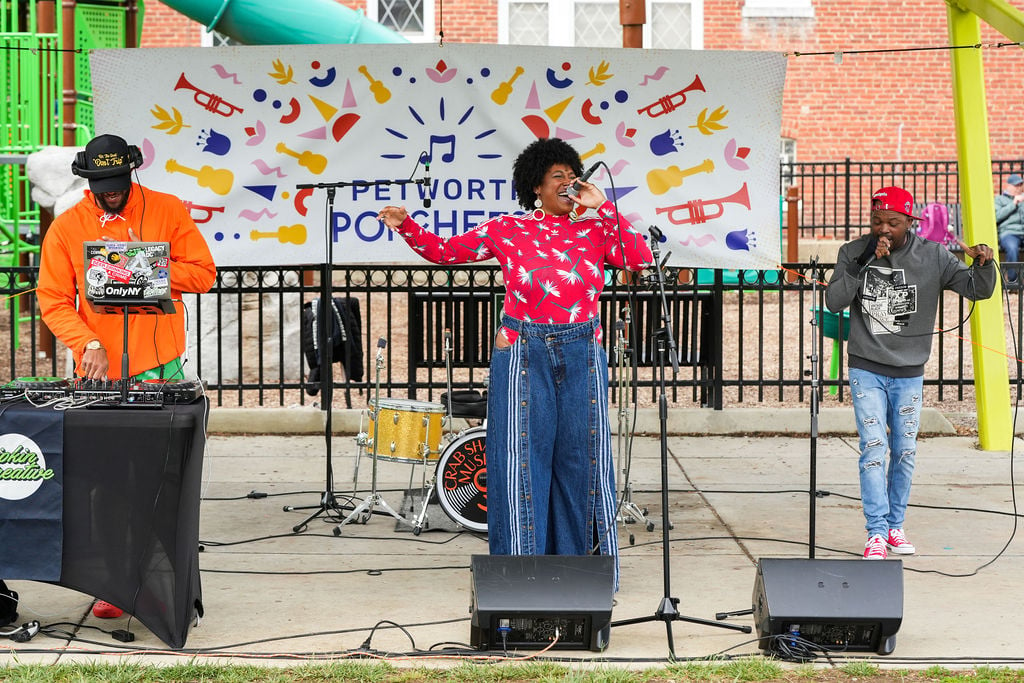
As the old joke would have it, a priest, a rabbi, and a lawyer walk into a bar. In
Anna Ziegler’s terrific, complex world premiere play
The Minotaur, currently playing in a production by Rorschach Theatre, the trio aren’t fodder for
some kind of inappropriate punchline—they’re a Greek chorus framing Ziegler’s contemporary
riff on an ancient tale.
Co-presented with Atlanta’s Synchronicity Theatre and directed by Rorschach’s
Randy Baker,
The Minotaur explores a familiar myth through a modern prism: Theseus (Josh Sticklin) is a callow youth with a smartphone and a leather necklace, and Ariadne (Sara Dabney Tisdale) is a doe-eyed teenager trying (as all teenagers do) to take charge of her own destiny.
She visits her half-brother, the beastly Minotaur (David Zimmerman) in his labyrinthine prison, and when he isn’t threatening to devour her the two
play Connect Four. (In case you’re not familiar with the tale, a quick primer: The
Minotaur was born to Ariadne’s mother, Queen Pasiphae, after the gods tricked her
into falling in love with a bull. The result is a half-man half-monster who eats only
human flesh and is condemned to live in a labyrinth under the palace.)
Ziegler’s take on the story is extraordinarily ambitious—her characters seem to exist
in a
Matrix-like universe where they’re condemned to play out the same story over and over again,
as shackled to their fates as the Minotaur is to his underground home. But for the
most part Baker’s production doesn’t get too bogged down in existential questions.
Staged inside Atlas Performing Arts Center’s Theatre Lab, the action takes place both
inside and outside a circle of seats where the audience sits (the set is by
David Ghatan). The walls are covered in a maze of brown string, and bare light bulbs occasionally
flicker overhead. The costumes, by
Lauren Cucarola, are modern and minimally intrusive—with the exception of the Minotaur, who sports
a blood-red suit and a gold headpiece that looks like a cross between a crown and
taxidermy, an effective visual reminder of his regal/beastly roots.
A few of the lines could be glib if it weren’t for the cast’s funny, engaging delivery.
Theseus tells Ariadne he’s met her before in “a chatroom for royals,” and at one
point Ariadne declares, “I am not in touch with my primal self! I get manicures!”
The humor is defused by the physical and sexual tension that underpins Ariadne’s interactions
with her brother, which seem to both mesmerize and disgust her. Zimmerman is terrific
as the cold but compelling monster, as insightful as he is menacing, and his character
becomes the antihero to Sticklin’s deliberately bland Theseus.
Playing a rabbi,
Jjana Valentiner shifts often and easily from her storyteller character to key supporting roles, while
Frank Britton (the priest) and
Colin Smith (the lawyer) are effective narrators, frequently appearing inside the circle as if
from nowhere. The ideas Ziegler raises with the chorus are profound, and occasionally
too nuanced for a relatively short piece of theater. Does the chorus represent the powerful forces
in contemporary society determining the fates of others? Is the storytelling process
a metaphor for playwriting? There are a cocktail of concepts floating around in Greek
drama at the best of times, and there are so many additional questions raised here
that it can be hard to keep up.
Still, the universally strong performances and the heady concepts of desire, self-control,
and fate make this an absorbing and inventive work. Without giving anything
away, the ending could easily be trimmed to make the show a little tighter, but the
characters are compelling enough nevertheless to carry this epic and intriguing journey.
The Minotaur, a production by Rorschach Theatre, is at Atlas Performing Arts Center through February 17. Running time: 90 minutes, with no intermission. Tickets ($30) are available via Rorschach’s website.


















